
Double Your Love. Double Your Impact.
Double Your Love. Double Your Impact.
Help provide 2x the care and support for millions affected by Alzheimer’s and advance research to bring us closer to a cure. Make a gift during our Double the Love 2x Match now.
Donate NowActor shares the career lessons that helped him as a caregiver
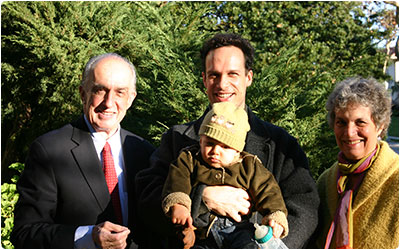 In 1996, actor Diedrich Bader reached a potentially life-altering crossroads in his career and, at the same time, also nearly missed out on a valuable lesson he would use years later as an Alzheimer's caregiver.
In 1996, actor Diedrich Bader reached a potentially life-altering crossroads in his career and, at the same time, also nearly missed out on a valuable lesson he would use years later as an Alzheimer's caregiver.After playing the character Oswald on the first season of ABC's "The Drew Carey Show," Bader, then 29, was disgruntled artistically and disappointed about not landing the lead role on a different sitcom. Filled with "the hubris of a young man," Bader decided he wanted out.
"Though I liked Drew the second I met him, I was a supporting player on his show," says Bader, now 55, speaking from the Los Angeles home he shares with his wife, 18-year-old son and 16-year-old daughter. "I wasn't the star. I wasn't number one on the call sheet."
The network refused to allow Bader to tear up his contract — which he now recognizes as a gift. The popular series ended up running for nine seasons. Bader calls his desire to exit "bonkers" in retrospect.
"[Leaving 'Drew Carey'] would've been the biggest mistake of my life, let alone my career," says Bader, who's appeared in films such as "Office Space" and "Napoleon Dynamite" and hit TV shows "Veep," "American Housewife" and "Better Things." "Halfway through the second season, this feeling of contentment sort of washed over me. I was just cocky when I was younger. The wisdom that age and experience brings you is realizing the sheer opportunity and luck that you need to get a series, and to seize it and appreciate it immediately."
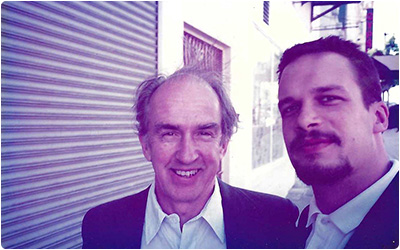 This lesson of appreciating what you have — and living in the moment — carried new significance for Bader when his father, William, began developing memory issues in 2009. Diagnosed with Alzheimer's in 2013, William died from the disease in 2016 at age 84.
This lesson of appreciating what you have — and living in the moment — carried new significance for Bader when his father, William, began developing memory issues in 2009. Diagnosed with Alzheimer's in 2013, William died from the disease in 2016 at age 84."It's a trap to look at the person [with Alzheimer's] and think, ‘This is what he or she was at one time, and look at him or her now,'" Bader says. "There's no point in it. It's extremely painful. I was much happier when I just dealt with the situation as it was in the exact moment — to be entirely present — and it's better for them as well."
A former CIA agent, longtime high-ranking diplomat and Senate staff member, William helped uncover U.S. government lies told to escalate the nation's involvement in the Vietnam War. He and his wife, Gretta, a renowned sculptor and artist, had four children.
Communication requires patience
Alzheimer's disease and other dementias gradually diminish a person's ability to communicate. We have strategies to help both you and the person living with dementia understand each other better.
"There's a lot of slack you have to cut the guy because he just didn't know what was expected of him," Bader says. "He did the best he could. Once I realized that what he really responded to was politics or history, then I started really paying attention [to what he did for a living] and tried to learn more."
As the disease progressed, William moved to a care community where he had numerous violent episodes. Apparently drawing on his CIA training, he once escaped from the building, injuring workers by using a plunger as a weapon. William eventually moved to a different nursing home that was better prepared for such occurrences.
When visiting his dad, Bader would call upon another lesson from his days on "The Drew Carey Show" that he learned from co-star Ryan Stiles: the improvisational comedy tenet of "Yes, and." A core principle of improv, the method calls for accepting what someone is saying in the scene as the truth and building on it — similar, Bader says, to how dementia experts encourage caregivers to meet people living with Alzheimer's where they are, in their reality. Following "Yes, and" provided Bader an emotional moment with William toward the end of his father's life.
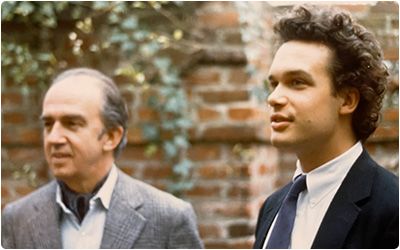 "He turned to me and goes, 'You need to shave,'" Bader says. "I said, 'Yeah, I just haven't gotten around to it.' He said, 'I should probably teach you.' Both of our beards were gray, and he taught me how to shave again. He gave me a full instruction, he lathered up and we did the razors side by side in the mirror. It was really beautiful."
"He turned to me and goes, 'You need to shave,'" Bader says. "I said, 'Yeah, I just haven't gotten around to it.' He said, 'I should probably teach you.' Both of our beards were gray, and he taught me how to shave again. He gave me a full instruction, he lathered up and we did the razors side by side in the mirror. It was really beautiful."Bader raises awareness as an Alzheimer's Association Celebrity Champion and encourages the use of "Yes, and" as a way to connect as best as possible with a loved one living with the disease.
"If I hadn't had 'Yes, and' in my head, I would've said, 'You know, I'm 50, I know how to shave.' I was grateful for that. It was a lovely moment."
Read More ALZ Magazine Articles
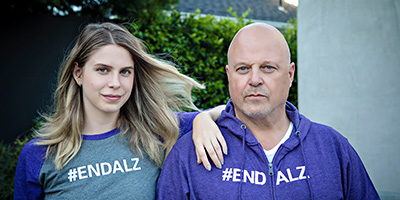
Blog posts
Michael Chiklis: Fighting Alzheimer’s is a Chiklis Family Effort
Fighting Alzheimer's is a family effort for actor Michael Chiklis and his wife and children.
July 19, 2021
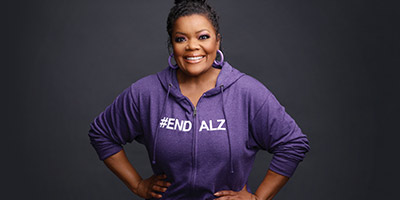
Blog posts
Yvette Nicole Brown: Her Challenging Off-Screen Role
Actress and Caregiver Knows the Devastation of Alzheimer’s
February 9, 2021
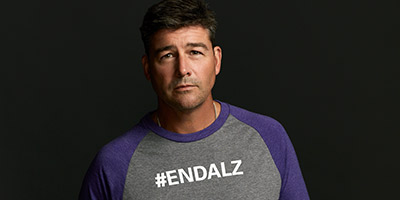
Blog posts
Kyle Chandler: Alzheimer’s Unscripted
Actor Discusses the Importance of Tough Talks for Families Facing Alzheimer’s
November 14, 2019

The first survivor of Alzheimer's is out there, but we won't get there without you.
Donate Now
Learn how Alzheimer’s disease affects the brain.
Take the Brain Tour
